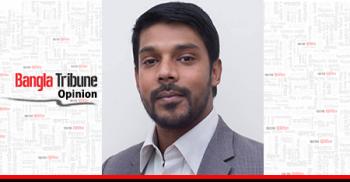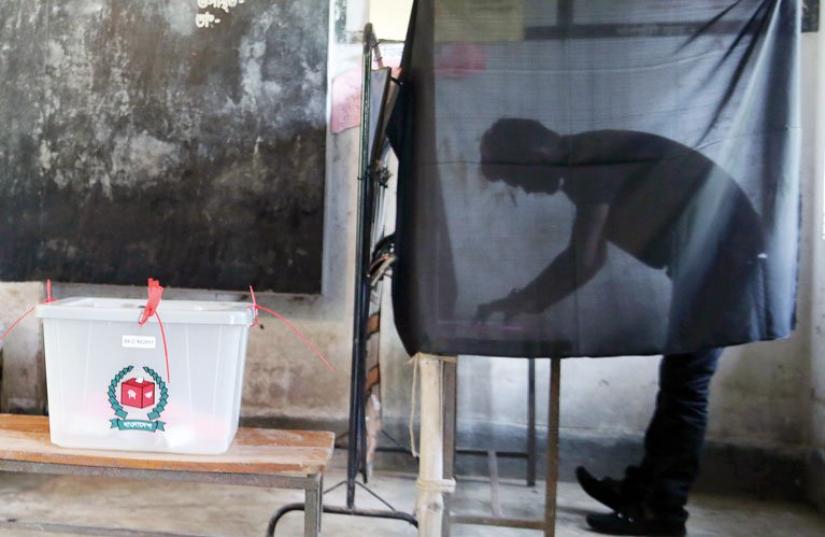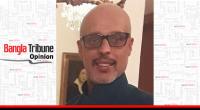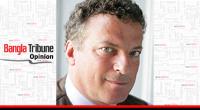 As official campaigns kick off for the upcoming election in Bangladesh, it is now time for the electorate to decide who should be leading the country for the next five years. While the formation of the Dr. Kamal Hossain-led Jatiya Oikya Front initially suggested that we may have a new dimension in our political landscape, the recent muscle-flexing of BNP’s acting chief Tarique Rahman regarding Oikya Front/BNP nominations and Dr. Kamal's decision not to contest the election himself, have made it abundantly clear that the players of the game, for all practical purposes, remain the same.
As official campaigns kick off for the upcoming election in Bangladesh, it is now time for the electorate to decide who should be leading the country for the next five years. While the formation of the Dr. Kamal Hossain-led Jatiya Oikya Front initially suggested that we may have a new dimension in our political landscape, the recent muscle-flexing of BNP’s acting chief Tarique Rahman regarding Oikya Front/BNP nominations and Dr. Kamal's decision not to contest the election himself, have made it abundantly clear that the players of the game, for all practical purposes, remain the same.
The choices for the people of Bangladesh are therefore limited between the Awami League led by Prime Minister Sheikh Hasina and the BNP led by mother and son duo — Khaleda Zia and Tarique Rahman. The question that naturally arises for the voters to settle is which side deserves to lead the country from 2019 to 2024. In other words, it’s for the people to assess what kind of leadership Bangladesh needs for its immediate future. For me, answering that question requires examining ten distinct qualities relating to political leadership.
First, we need a leadership that stays on the course to complete the development trajectory the country is currently on. We must be able to carry forward the remarkable economic, social and human development successes witnessed over the last ten years. This needs to be complemented with forward-looking policies to tackle the challenges of the long-term future such as preparing for the fourth industrial revolution or tackling the adverse impacts of climate change.
Second, we need a humane leadership that believes in inclusive development. We must build on the successes of the last decade in prioritising and mainstreaming the needs of marginalised sections of our populace including the physically-challenged, the transgender (Hijras), ethnic and religious minorities and so on.
Third, we need leadership that will keep the country and its people safe from threats, both internal and external. Over the last decade, Bangladesh has fought strongly and commendably against terrorism and violent extremism. This ‘zero-tolerance’ policy against such tendencies must continue. There must be no return to the days of deadly outfits like JMB or Harkat ul Jihad being provided state sponsorship and patronage. Additionally, we need to be vigilant against the radicalisation of our youth.
Fourth, we need leadership that continues to uphold the spirit of the Liberation War. Bangladesh’s founding ideals of secularism, democracy, socialism (social justice) and nationalism must be respected and implemented in our national policies. This also requires strict prevention of all forms of historical distortions and ensuring the dissemination of an accurate historical account of our freedom struggle to the young and next generations.
Fifth, we need leadership that can continue Bangladesh’s ongoing justice process against the criminals who committed genocide and other international crimes during the 1971 Liberation War. This is coupled with the need to apprise the international community of the genocide we suffered. At the very least, we do want to see the national flag, the source of our national pride, to adorn the cars of war criminals like 2001-06 or see them getting political parties’ tickets for the election like 2018.  Sixth, we need a leadership that is honest and free from corruption. While corruption remains a big challenge for this country, for the last ten years, we at least had the consolation that the highest levels of political leadership were clean. We must not go back to the days of ‘Hawa Bhaban’. Such leadership must also initiate a strong legal and social campaign to root out corruption from all levels.
Sixth, we need a leadership that is honest and free from corruption. While corruption remains a big challenge for this country, for the last ten years, we at least had the consolation that the highest levels of political leadership were clean. We must not go back to the days of ‘Hawa Bhaban’. Such leadership must also initiate a strong legal and social campaign to root out corruption from all levels.
Seventh, we need a leadership that will continue to enhance Bangladesh’s profile and image on the international stage. Whether for the country’s success stories in various sectors or its humanitarian role played vis-à-vis the Rohingyas, international headlines on Bangladesh have changed drastically for the better in the last decade. This needs to continue. We do want to be known simply for the natural disasters we encounter but also how successfully we have built our resilience and acquired the capacity to manage such disasters.
Eighth, we need a leadership that can strike the necessary diplomatic balance between the competing global powers to carve out a separate space for Bangladesh commensurate with our geo-strategic importance. Over the last ten years, we have been able to maintain friendly relations with our biggest neighbour India while we have not compromised our own national interests such as delineating our maritime boundary or signing the land boundary agreement. By the same token, our development cooperation with countries, like China and Japan are better than ever before.
Ninth, we need a leadership which delivers on the political promises and pledges of development. Bangladesh has witnessed the rise of what is known as ‘politics of development’ in recent years, thanks primarily to the current Prime Minister Sheikh Hasina, whereby national development has taken the centre stage in election manifestos. This positive trend must continue to be a key feature in the future politics of Bangladesh.
Lastly, we need a leadership which addresses the needs of the two most important segments of our population, women and youth. Bangladesh’s women have made rapid progress over the last ten years in all aspects of life. That march forward needs to receive continued patronage. The desired leadership must also be able to effectively and practically tackle such concerns of the youth as enhancing the quality of education and to help create new jobs with workable and realistic policies.
As to which political camp possesses the aforementioned qualities, I leave it up to the wisdom of my readers to decide. But the importance of reason and logic in voting in the upcoming election can’t be overstated. There used to be a campaign based on the Bangla slogan: ‘Amar Vote Ami Dibo, Jake Khushi Take Dibo’ which roughly translates as ‘I will vote for whomever I choose’.
I sincerely believe that attitude needs to change. One’s vote is the most important capital one possesses in a democracy. It should not be used whimsically but only after one has considered the track record and future plans of each competing side. If we fail to do that, then we will be left with the leadership we deserve, rather than the leadership we need.
A lawyer, researcher and political activist, Shah Ali Farhad is a senior analyst at the Centre for Research and Information (CRI).


